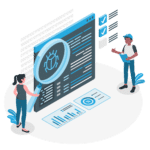Recap of KMS Technology’s Salesforce 2024: Unleashing Data Harmony and Integrity Innovations Webinar
At KMS Technology’s recent webinar on unleashing data harmony and integrity innovations with Salesforce, industry experts delved into the challenges and solutions surrounding data integrity, insights, and analytics within the Salesforce ecosystem. The event provided valuable insights and practical strategies for businesses looking to optimize their Salesforce implementations and harness the power of data-driven decision-making.
Meet the Speakers:
- Jeremy Lambert, Salesforce Practice Director at KMS Technology
As a Salesforce Practice Director at KMS Technology, Inc., Jeremy brings over 16 years of extensive experience in Salesforce implementation and delivery of complex projects. With a deep understanding of the Salesforce ecosystem, Jeremy has spearheaded numerous end-to-end Salesforce implementations, helping organizations leverage the power of cloud-based CRM solutions to optimize their sales, marketing, and customer service operations.
- Mike Chandler, Senior Director, Commercial & Strategic Accounts at KMS Technology
With over 13 years in the Salesforce partner ecosystem, Mike Chandler has advised both Fortune 500 companies and startups across various industries including technology, manufacturing, financial services, retail, consumer goods, e-commerce, and healthcare. At KMS, Mike spearheads Salesforce consulting, technology business development, and account management.
- Will Albers, Senior Director of Data Acquisition at NFL
Will Albers is a seasoned professional with over two decades of expertise in Data & Analytics. Throughout his career, he has demonstrated a keen focus on enhancing the customer data journey for prominent organizations across commercial, manufacturing, retail, and entertainment sectors. Will brings a wealth of experience and a proven track record of success to drive data-driven initiatives and propel organizational growth for the NFL.
Here’s a recap of the key points discussed during the panel discussion:
1. Addressing Data Integrity Challenges Across Industries
Will Albers, with extensive experience across various industries including sports entertainment, automotive, information services, and more, highlighted the common challenges in maintaining data integrity. From government to retail to entertainment, industries face similar issues such as data silos, lack of data curation processes, and unknown data lineage. These challenges underscore the importance of implementing robust data governance principles and processes to ensure accurate and reliable data.
“…You think with industries so different than the next that you’d have different challenges. But in fact it’s not really the case. What I’ve seen in my years is how similar all of these industries are and how these data problem sets are very similar”
“…We get to the basics of standardizing data, it’s very important to do so and to make sure that your accuracy and your timeliness are as solid as they can be. Another thing that comes up is data lineage. I rarely see organizations put data lineage into place properly. Usually, data lineage is in somebody’s mind who has been there for 20 years, getting that onto paper can be a challenge but it’s absolutely valuable all of these are probably more governance focused…”
2. Streamlining Data Integration with Salesforce Data Cloud
Jeremy Lambert, our Salesforce Practice Director, emphasized the importance of breaking down data silos and fostering better data insights. He recommended leveraging Salesforce Data Cloud as a central hub for integrating data from various sources. Data cleansing and standardization tools within Data Cloud enable businesses to ensure data accuracy and consistency, while data quality monitoring capabilities help proactively identify and address potential issues.
“…Data silos are a major hurdle when businesses are trying to achieve a successful digital transformation. Salesforce offers a lot of solutions to that and Customer 360 is the core. if you’re using Customer 360 you’ve got Sales, Service, Marketing, and Commerce Clouds covering and connecting those parts of the business…”
“…We want a collaborative data culture, making sure departments are working together making sure they’re not putting walls up. The systems can do all that they can to integrate the data, harmonize the data, etc. but you’ve got really got to foster that culture within your organization…”
3. Navigating the Analytical Journey with a Customer-Centric Approach
Will discussed the concept of the “analytical journey” and emphasized the importance of a customer-centric approach. Highlighting the need to define clear goals and focus on improving customer engagement through data-driven insights. Will’s principles and philosophies around data analytics provided valuable guidance for organizations embarking on their analytical journey.
“…When you hear people talking about segmentation, groupings, and anonymized data this is what they’re talking of it’s this really of seeing this beginning of the analytic journey. Knowing an individual is knowing more than what they bought with you but how they engage with other things that are related, knowing their family structure, their demographics, foundational but also knowing how they engage with your partners or other aspects. In my industry, the entertainment industry are they going to movies? are they going to concerts? are they going to games? are they buying video games? are they buying jerseys? there are so many ways you can see how an individual engages with your area of expertise from multiple dimensions, trying to capture that is incredibly important…”
4. Maintaining Data Integrity Best Practices with Salesforce
Jeremy outlined Salesforce’s features and tools for maintaining data integrity, including data validation rules, data cleansing tools, and data governance processes. By leveraging these tools and fostering a data-quality culture, organizations can ensure the accuracy and reliability of their data within the Salesforce platform.
“…Data Cloud and Salesforce in general offer tons of features around defining data definitions, making sure formats are inputted correctly, and people have the right access to the right data. All of these tools ensure data quality and consistency enabling smooth integration and analysis of the data. A more non-technical approach and important to all of this is breaking down departmental barriers. So fostering collaboration and communication between departments is essential and this is more of a lead by example. It’s a culture thing to encourage information sharing and joint ownership of customer data to break down the data silos and promotes a data-driven culture…”
“…Data lineage tracking is something Data Cloud does very well, it tracks the origin transformation of steps applied throughout the process. So you can go back and see when it was modified and how it was modified and track back to any potential errors and then you can adjust rules and validations and things like that within the platform to prevent those errors from happening. Data governance was another thing we mentioned, Data Cloud is best in breed as far as providing some of the ways to track these things and ensure data governance’s policies are in place. So including data ownership access controls, data quality policies, this all helps to ensure proper data management practices are followed both as administrators and end users to reduce the risk of unauthorized modifications to that data or inaccurate data entry…”
5. Leveraging Salesforce for Sales, Service, and Marketing
Jeremy discussed the use cases for Salesforce Customer 360, specifically highlighting its integration with Sales, Service, and Marketing Clouds. From enhanced sales forecasting to personalized customer support and predictive marketing insights, Salesforce offers a comprehensive suite of solutions to drive business growth and improve customer engagement.
“…Salesforce Customer 360 equips businesses with a deeper understanding of their customers and aids those personalized interactions and consistent interactions through all touch points. Sales, Service, Marketing and foster stronger customer relationships which ultimately drive business growth. One other thing I wanted to comment on is, that I think it’s just a very important philosophy is start simple progress rapidly…”
Conclusion
KMS Technology’s webinar provided valuable insights and practical strategies for businesses looking to optimize their Salesforce implementations and harness the power of data-driven decision-making. By addressing data integrity challenges, streamlining data integration, and leveraging Salesforce’s capabilities, organizations can unlock new opportunities for growth and success in today’s competitive landscape.






